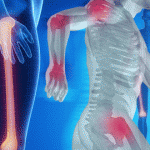The accepted wisdom is that the negative effects of glucocorticoids on bone depend on the dose and treatment duration. Adami et al. conducted this study to determine, in a real-life setting, the risk of fragility fracture associated with the dose of glucocorticoids in patients with inflammatory rheumatic musculoskeletal diseases.

Glucocorticoid Use May Result in Loss of Bone Mineral Density
Adami et al. examined the fracture risk associated with glucocorticoid treatment in women with inflammatory rheumatic musculoskeletal diseases, finding that low-dose glucocorticoid use may result in significant bone mineral density loss in patients who are not on anti-osteoporotic drugs.

Denosumab Has Edge on Alendronate for Steroid-Induced Bone Loss
NEW YORK (Reuters Health)—Long-term glucocorticoid users see greater gains in spine bone-mineral density when treated with the monoclonal antibody denosumab vs. oral alendronate, a small clinical trial shows. The drug also proved superior at lowering bone-turnover markers at 12 months, researchers in Hong Kong report in Bone.1 “Denosumab may be considered as an alternative first-line…
Zoledronate After Denosumab Does Not Fully Prevent Bone Loss
NEW YORK (Reuters Health)—In postmenopausal women and men treated for at least two years with denosumab, a single infusion of zoledronate given after denosumab discontinuation does not completely prevent bone turnover and loss, researchers say. Given the findings, “bone mineral density (BMD) should probably be higher than the current target for discontinuation of bisphosphonate treatment…

Dietary Calcium Intake Not Associated with Bone Loss
Postmenopausal women are often told to consume more than 1,500 mg of calcium daily to reach neutral bone balance. But new research suggests this recommendation should be revised, finding no connection between dietary calcium intake and postmenopausal bone loss…

Antibodies Against Oxidized Phospholipids Protect Against Osteoporosis
It has long been known that hyperlipidemia adversely affects bone, but the exact pathologic mechanism(s) underlying hyperlipidemia-induced bone loss has not been fully understood. Until now. Pathogenesis of Osteoporosis New research by Ambrogini and colleagues shows that oxidation-specific epitopes derived from lipid peroxidation contribute to the pathogenesis of osteoporosis.1 Importantly, the research shows that innate…

Rheumatology Drug Updates: Hip Fracture Rates After Bisphosphonate Drug Holidays, Plus More on Golimumab, Ustekinumab
Bisphosphonate Drug Holidays Drug holidays are common for patients on bisphosphonate therapy. Often, these breaks in treatment are related to known U.S. Food and Drug Administration (FDA) warnings and drug class adverse effects. Currently, data on fracture risk related to drug holidays are limited. In recent research highlighted at the 2017 ACR/ARHP Annual Meeting ,…

SSRIs Act Centrally to Cause Bone Loss
In a recent study, investigators examined the effects of both the short- and long-term use of selective serotonin-reuptake inhibitors (SSRIs) on the development and loss of bone. The study results describe the mechanisms by which SSRIs, specifically fluoxetine, affect osteoclasts short term to increase bone mass, but also how the treatment may cause bone loss at six weeks in mice…

The Gut Microbiome Influences Postmenopausal Bone Loss
Bone health has been successfully improved by using probiotics to influence the gut microbiome in postmenopausal women with osteoporosis. New research has gained insight into this process, uncovering that sex steroid depletion increases gut permeability resulting in inflammation and pathology in mice. Treatment with probiotics also prevents this increase in gut permeability and bone loss associated with sex steroid depletion…

Researchers Work to Untangle the Relationship Between Blood Lipids, Bone Health & Diet
A recent editorial examined research findings on how low levels of high-density lipoprotein (HDL) in the blood affect bone health, resulting in cartilage dysfunction and the development of osteoarthritis (OA). Authors note that a high-fat diet in mice with HDL deficiency resulted in OA development; thus, they conclude that in patients with metabolic syndrome, HDL may have a causative relationship to OA…